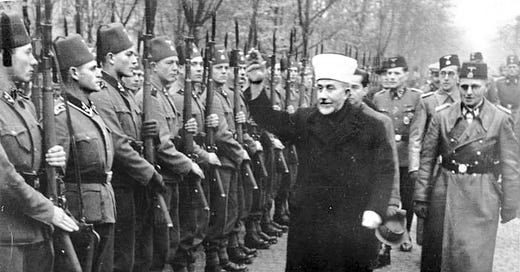A claim often made during discussions of the current Israeli-Palestinian conflict is that Hamas's resistance is purely a reaction against Israel's increased occupation since 1948. This, however, ignores the deeply embedded reality of Islamic antisemitism, whose scriptural basis I have repeatedly pointed out in previous articles, including this one on the origins of the Jew-hatred of HAMAS.
It is important to remember that hatred towards Jews inspired by Islam long predates the establishment of the state of Israel. In fact, there are hundreds of historical examples of massacres perpetrated against Jewish communities within the world of Islam.
Perhaps there is no more iconic figure symbolizing hatred towards Jews from some within the Arab Muslim community than Amin al-Husseini, widely known as the Grand Mufti of Jerusalem. Husseini not only spoke strongly against the Jewish people, using invective and hatred, but also put his words into action by actively collaborating with the Nazis during World War II. This article will focus on Husseini's career, his statements, and his actions, to show that even before 1948, Muslim Arabs in Palestine harbored genocidal intent towards the Jewish people.
Early Life and Political Rise
Husseini was born in Jerusalem in 1897, into an influential Arab family. Growing up in a politically and religiously charged environment, he pursued a religious career, studying at the prestigious Al-Azhar University in Cairo, followed by further studies in Istanbul, the capital of the Ottoman Empire. Upon returning to Palestine after World War I, during the period of the British Mandate, he was alarmed by the increasing migration of Jewish people to the region. Husseini viewed this as a threat to the Arab and Muslim character of Palestine. Under the British Mandate, the authorities tried to keep the communities apart, but not always successfully. Husseini became increasingly vocal in his calls for Arab and Muslim unity against what he saw as European-led efforts to turn Palestine into a Jewish enclave.
Involvement in the 1920 Riots and Rise to Power
In 1920, a series of riots known as the Nabi Musa riots erupted in Jerusalem, with Husseini actively attacking the Jewish community. He was arrested, tried, and sentenced to ten years in prison, but the sentence was eventually commuted, and he went into exile. During this period, he developed his political activism, building links with like-minded people throughout the Arab world. In 1921, Husseini became the Mufti of Jerusalem, a position that carried significant political and religious influence. British authorities may have hoped that granting him this power would moderate his behavior, but they were mistaken. Although appointing someone from an influential family may have placated Arab nationalist sentiment, Husseini's personal radicalism quickly turned him into a liability.
Political Power and Religious Control
As Mufti, Husseini also became the head of the Supreme Muslim Council in 1922. This body controlled Islamic law, religious endowments, and the recruitment of religious judges. Husseini used these avenues to strengthen Muslim opposition to Jewish immigration into Palestine, framing the issue as a religious imperative. By the 1930s, tensions between Jews and Arabs in Palestine had escalated, and Husseini's activities became increasingly problematic for the British. He was deeply involved in the 1936–1939 Arab Revolt, an uprising against both British rule and Jewish immigration. This led to his permanent exile, first to Lebanon and later to Iraq, from where he continued to advocate for Islamic resistance against British and Jewish influence in Palestine.
Collaboration with the Nazis
The 1930s obviously also saw the rise of Nazi power in Germany, and Husseini began exploring ways to collaborate with them in his struggle against the Jews. He believed that if the Nazis were victorious in World War II, it would lead to the collapse of Jewish political power in the Middle East, ending Jewish aspirations for a state in Palestine. Husseini saw the Nazis as natural allies due to their shared antisemitism, even though it was rooted in different motivations—Nazis' racial theories versus Husseini's Islamic convictions. Husseini's admiration for the Nazis grew, and in 1941, he relocated to Germany, becoming an integral part of the Nazi propaganda machine.
He met with Adolf Hitler and sought Nazi support for Arab independence and the elimination of Jewish presence in Palestine. Hitler assured Husseini that the destruction of the Jews was a priority for the Nazi regime and that the Jewish presence in the Middle East would be dealt with following a Nazi victory.
Nazi Propaganda and SS Recruitment Activities
Husseini was extensively used in Nazi propaganda efforts. He hosted a radio show in Arabic, urging people across the Middle East to support the Axis powers and rebel against British colonialism. His broadcasts framed the war not only as anti-imperialist but also as a struggle against the Jewish people, echoing Nazi rhetoric. Husseini's statements left no doubt whatsoever that he was fully aligned with Nazi aims. Here are some direct quotes from Amin al-Husseini, during this period, where he expresses hatred and genocidal intent towards Jews:



